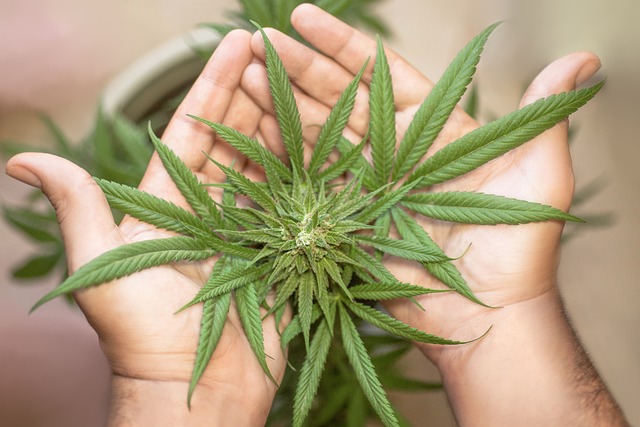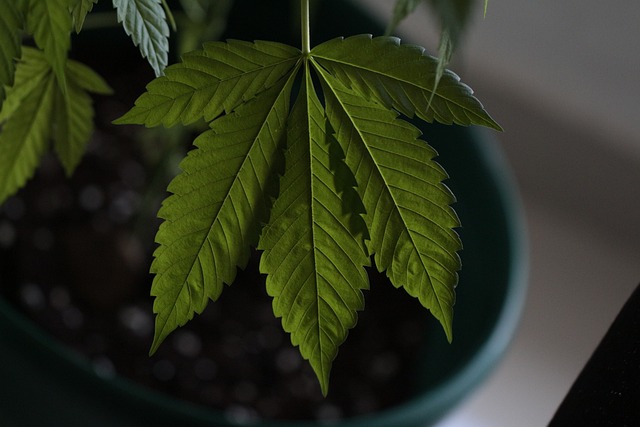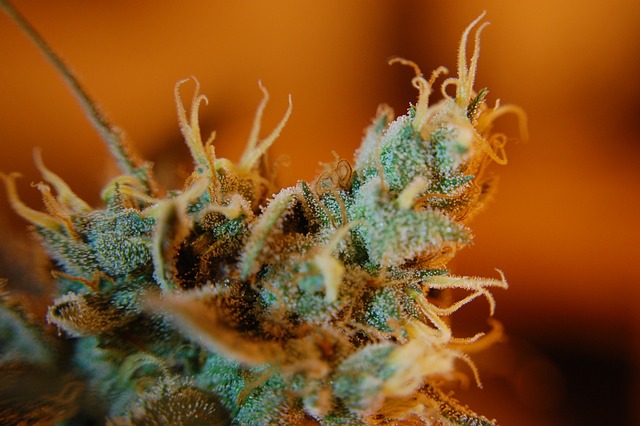The THCA flower, a non-psychoactive component of the cannabis plant, has been studied for its significant anti-inflammatory properties. Research indicates that THCA engages with the endocannabinoid system and can bind to both CB1 and CB2 receptors, potentially offering relief from inflammation without psychoactive effects. Its efficacy is attributed to its ability to inhibit certain enzymes and cytokines in the inflammatory cascade, which could benefit those with arthritis, multiple sclerosis, and other inflammatory conditions. THCA's anti-inflammatory action also extends to neuroprotective benefits, making it a potential treatment for neurodegenerative diseases. The non-psychoactive nature of THCA flower suggests it as a safer alternative to traditional cannabis products with psychoactive side effects. As the understanding of its therapeutic potential grows, THCA flower's anti-inflammatory compounds are poised to become a valuable addition to wellness regimens and possibly a mainstream therapeutic option subject to further clinical trials and regulatory considerations.
Discover the multifaceted benefits of THCA flower, a natural powerhouse recognized for its anti-inflammatory properties. This article delves into the potential of THCA, unveiling its role as a potent compound against inflammation. We explore the scientific mechanisms that make THCA a promising option for managing chronic inflammation, backed by robust evidence and research insights. Whether you’re considering it for wellness or health, learn how to safely incorporate THCA flower into your daily routine. As we navigate through its applications and future prospects in healthcare, stay informed on the transformative impact of this extraordinary botanical compound.
- Unveiling the Potential of THCA Flower: A Natural Source of Anti-Inflammatory Compounds
- The Science Behind THCA Flower: Understanding Its Anti-Inflammatory Mechanisms
- THCA Flower's Role in Inflammation Reduction: Evidence and Research Insights
- Harnessing the Healing Power of THCA: Applications for Chronic Inflammation
- Integrating THCA Flower into Your Wellness Routine: Dosage and Methods
- The Future of THCA Flower in Healthcare: Prospects and Considerations
Unveiling the Potential of THCA Flower: A Natural Source of Anti-Inflammatory Compounds

Uncovering the therapeutic properties of THCA flowers reveals a natural trove of anti-inflammatory compounds that hold promise for those seeking relief from inflammatory conditions. Tetrahydrocannabinolic acid (THCA), the raw, non-psychoactive precursor to THC found in cannabis plants, has garnered attention for its potential health benefits. Among these, the anti-inflammatory effects are particularly notable. Research indicates that THCA interacts with the body’s endocannabinoid system, modulating pain and inflammation responses without the psychoactive effects associated with THC. This interaction may offer a safe and effective treatment option for various inflammatory disorders, including arthritis and multiple sclerosis, by mitigating the damaging effects of inflammation. The anti-inflammatory properties of THCA are attributed to its ability to inhibit certain enzymes and modulate immune responses, making it a subject of ongoing scientific investigation for its potential in natural therapeutic approaches. As such, THCA flowers represent a promising, plant-based alternative for managing inflammation-related symptoms, with the potential to offer substantial health benefits without the psychoactive side effects typically associated with cannabis use.
The Science Behind THCA Flower: Understanding Its Anti-Inflammatory Mechanisms

The therapeutic potential of THCA, or tetrahydrocannabinolic acid, found in the THCA flower, is gaining significant attention within the scientific community due to its anti-inflammatory properties. Unlike its psychoactive counterpart THC, THCA does not induce psychoactive effects, making it a more appealing option for individuals seeking relief from inflammation without the high associated with cannabis consumption. Studies have shown that THCA interacts with the body’s endocannabinoid system through its affinity for both CB1 and CB2 receptors, which are key players in regulating immune responses and inflammation. By modulating these receptors, THCA flower compounds can exert anti-inflammatory effects that may benefit those with conditions like arthritis or autoimmune disorders. The anti-inflammatory mechanisms of THCA are thought to be driven by its ability to inhibit certain enzymes and cytokines involved in the inflammatory cascade, thereby potentially reducing pain and swelling. Additionally, the anti-inflammatory action of THCA is also believed to involve the peroxisome proliferator-activated receptors (PPARs), which are a group of nuclear receptor proteins that play a role in regulating inflammation, lipid metabolism, and glucose homeostasis. The precise biological pathways and interactions are still under investigation, but the potential for THCA flower as an anti-inflammatory agent is promising, suggesting a novel approach to treating inflammation-related conditions without the psychoactive side effects of traditional cannabis products.
THCA Flower's Role in Inflammation Reduction: Evidence and Research Insights

Recent scientific investigations have shed light on the potential anti-inflammatory properties of THCA flower, a non-psychoactive compound found in the Cannabis sativa plant. Research has indicated that THCA, or tetrahydrocannabinolic acid, possesses a unique structure that may influence certain inflammatory responses. Laboratory studies have demonstrated that THCA can inhibit certain enzymes and molecular pathways linked to inflammation, suggesting a mechanism through which it might offer protective effects against inflammatory conditions. The anti-inflammatory compounds present in THCA flower are believed to target key molecules involved in the body’s immune response, potentially offering relief for those suffering from inflammatory disorders. Preclinical trials have shown that THCA can modulate cytokine production, a critical aspect of the immune system’s inflammatory response, without inducing psychoactive effects typically associated with other cannabinoids like THC. These findings are promising and underscore the need for further research to understand the full extent of THCA flower’s anti-inflammatory capabilities and its potential therapeutic applications in addressing inflammation-related health issues.
Harnessing the Healing Power of THCA: Applications for Chronic Inflammation

Recent scientific studies have shed light on the potential therapeutic properties of THCA, or tetrahydrocannabinolic acid, a non-psychoactive compound found in the cannabis plant. The THCA flower, rich in this cannabinoid, has garnered attention for its anti-inflammatory effects. Chronic inflammation is a common affliction that underlies many diseases and conditions, including arthritis, inflammatory bowel disease, and various autoimmune disorders. THCA’s anti-inflammatory compounds may offer relief by inhibiting the pro-inflammatory cytokines and enzymes responsible for perpetuating inflammation within the body. Preclinical research indicates that THCA can help modulate the immune response, reducing the symptoms associated with chronic inflammation without the psychoactive effects typically linked to its more famous counterpart, THC. This makes THCA a promising candidate for natural anti-inflammatory treatments, offering hope for those seeking alternative or complementary therapies for managing inflammatory conditions effectively.
Furthermore, the anti-inflammatory properties of THCA are not its sole advantage. Evidence suggests that THCA may also exhibit neuroprotective effects and could be beneficial in treating neurodegenerative diseases such as multiple sclerosis and amyotrophic lateral sclerosis (ALS). The compound’s ability to reduce inflammation in the central nervous system holds significant promise for therapeutic applications. Incorporating THCA flower into one’s wellness regimen could potentially offer multifaceted benefits, targeting both the chronic pain and inflammation often associated with various health conditions. As research continues to evolve, the role of THCA in harnessing its healing power for a range of therapeutic applications becomes increasingly clear, particularly for those dealing with the challenges of chronic inflammation.
Integrating THCA Flower into Your Wellness Routine: Dosage and Methods

Incorporating THCA (Tetrahydrocannabinolic Acid) Flower into your wellness routine can be a beneficial addition for those seeking to harness its anti-inflammatory compounds. THCA is the raw, non-psychoactive form of THC (Tetrahydrocannabinol), which has been studied for its potential therapeutic properties, including anti-inflammatory effects that may be advantageous for managing various health conditions. To integrate THCA Flower into your daily routine, it’s important to consider the dosage, as the optimal amount can vary based on individual body chemistry and health goals. A common starting point is a small pinch or half a gram of ground flower, which can be gradually increased according to personal tolerance and desired effects.
When it comes to methods of consumption, THCA Flower can be enjoyed in several ways. It can be smoked or vaporized for immediate effects, providing relief that can be felt within minutes. For those preferring ingestible options, the flower can be infused into edibles like teas or oils, which may offer a longer duration of effect but with a slower onset. Regardless of the consumption method chosen, consistency is key to experiencing the full range of benefits associated with THCA’s anti-inflammatory compounds. Always ensure proper dosing and consider consulting with a healthcare professional before integrating THCA Flower into your wellness regimen, especially if you have underlying health conditions or are taking other medications.
The Future of THCA Flower in Healthcare: Prospects and Considerations

The THCA flower, rich in tetrahydrocannabinolic acid (THCA), has garnered attention for its potential health benefits, particularly its anti-inflammatory properties. As research continues to evolve, the therapeutic applications of THCA are being explored with increasing rigor. THCA, the precursor to THC (tetrahydrocannabinol), exhibits a promising profile that may offer relief from inflammation without the psychoactive effects associated with its derivative. This makes it an attractive candidate for incorporation into healthcare regimens, where traditional anti-inflammatory medications may fall short due to side effects or inefficacy in certain individuals. The future of THCA flower in healthcare hinges on clinical trials and studies that aim to elucidate its efficacy and safety profile. As these investigations progress, the potential for THCA to become a staple in holistic and integrative medicine practices becomes increasingly plausible, offering novel avenues for managing inflammatory conditions. The consideration of regulatory frameworks, public acceptance, and further scientific validation are critical steps that will shape the integration of THCA flower into mainstream healthcare systems. With each stride in understanding its mechanisms of action, the prospects of this natural compound contribute to a growing body of evidence supporting its anti-inflammatory compounds as a beneficial addition to health and wellness strategies.
In conclusion, the potential of THCA flower as a natural source of anti-inflammatory compounds offers promising avenues for incorporating it into wellness routines. The scientific community has made significant strides in understanding how these compounds work at a mechanistic level, which could pave the way for innovative treatments for chronic inflammation. The research to date suggests that integrating THCA flower into one’s daily regimen holds considerable benefits, though further studies will be crucial to fully realize its healing potential and guide appropriate dosage forms. As this field of study evolves, it is anticipated that THCA flower may play a substantial role in the healthcare arena, offering natural alternatives for managing inflammation-related conditions.
